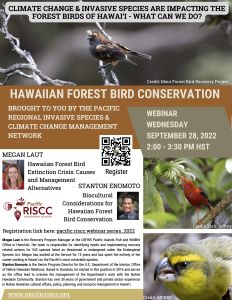Hawaiian Forest Bird Conservation
Wednesday, September 28, 2022 from 2:00 – 3:30 PM HST
A Pacific RISCC Webinar via Zoom
Webinar overview:

Speaker details:
Hawaii’s endemic forest birds are facing an extinction crisis. Avian malaria, a disease transmitted by invasive mosquitoes, is driving their extinction – for some species, a single bite by an infected mosquito can kill. As climate change accelerates, mosquitoes are expanding their range into upper elevation forests, threatening what little safe habitat these birds have left. Four species are on the brink of extinction, and the biologists that manage them agree that without conservation actions to address disease mortality, these species have a high probability of going extinct within several years. To help evaluate alternative conservation strategies for minimizing the risk of extinction, we convened experts with broad experience in Hawaiʻi forest birds and ecosystems, as well as the management approaches being considered, to assess the probability of success of alternative management actions. The three alternative management actions being considered to prevent the extinction of forest birds from disease are (1) landscape-level mosquito control through the Wolbachia Incompatible Insect Technique, (2) captive care, and (3) conservation translocations. This presentation will summarize the findings from the elicitation and action taken to date.
This presentation seeks to provide a biocultural context for the conservation of endemic Hawaiian forest birds at risk of extinction due to climate change and disease transmitted by invasive species. In 2021, U.S. Department of the Interior bureaus in Hawaiʻi endeavored to approach forest bird conservation in a more comprehensive and respectful manner. Native Hawaiian cultural practitioners and subject matter experts were convened to better understand the cultural connection and relationship Native Hawaiians have with endemic and native species and their habitats across Hawaiʻi. Proposed forest bird conservation actions were also presented and discussed. Perspectives and input received was used to establish a more culturally-appropriate approach and to develop strategies that integrate Native Hawaiian biocultural knowledge and practices into the planning and implementation of the conservation actions. The goals of which are to increase the efficacy of conservation efforts and to sustain the connectivity and relationship between Native Hawaiians and endemic forest birds and their habitat.
Additional Resources
For a USGS News Report about the recent HCSU technical report “Hawaiian Forest Bird Conservation Strategies for Minimizing the Risk of Extinction: Biological and Biocultural Considerations”, with link to the report (HCSU-103), head over to the USGS page.

